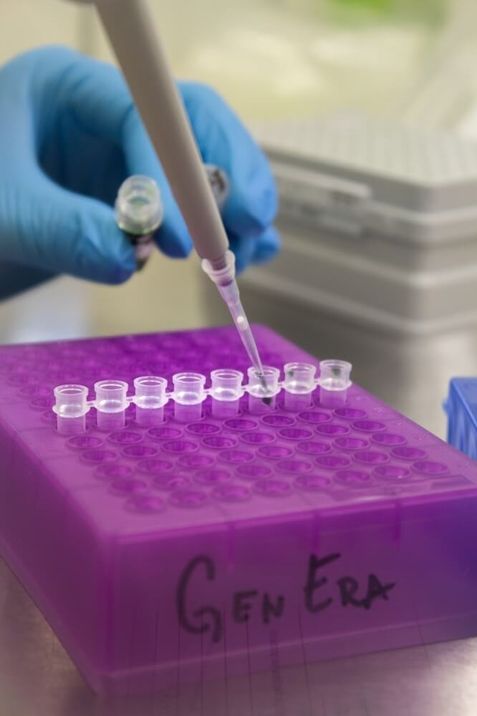Celiac disease genetic testing
Attention! Changes due to the COVID-19 pandemic!
The laboratory accepts clients and patients in person strictly by prior appointment. To apply for a visit, write to info@genera.lv or call us 26267833! We recommend that you perform the DNA test remotely. More information here.

What is celiac disease?
Celiac disease is an autoimmune (a disease in which the human immune system begins to attack various tissues of the body itself) disease of the small intestine that can develop at any age in people with certain genetic characteristics.
Symptoms of celiac disease include diarrhoea, fatigue, stomach upset, and bloating. The disease can also manifest itself without any abdominal symptoms. Celiac disease can also be indicated by, for example, iron deficiency anaemia, unexplained fatigue, depression, itchy rash (dermatitis herpetiformis), changes in tooth enamel, etc. The disease can also be asymptomatic.
Celiac disease is caused by a reaction to the protein gliadin, which is a gluten protein found in wheat. Similar proteins are found in barley and rye. The only effective treatment is a lifetime gluten-free diet.
The role of genes in the development of celiac disease
HLA or Human Leukocyte Antigens is a group of genes located in the short arm of the 6th chromosome. They produce molecules that are actively involved in various immune system reactions. These molecules present to our immune system various substances that are formed inside or enter the body, and in this way can directly affect the response of the immune system.
The interaction between the genes that cause celiac disease and the environment plays an important role in the development of celiac disease. The results of many studies show that for this disease to develop, the individual must carry two variants of the HLA gene, HLA-DQ2.5 and/or HLA-DQ8. Undoubtedly, the most important environmental factor is the consumption of gluten-containing foods.
For celiac disease patients:
the test for one or both of these gene variants is positive in 97% of cases;
the test for DQ2.5 gene variants is positive in 90% of cases;
the test for DQ8 gene variants is positive in less than 10% of cases.
However, even if a person has been diagnosed with these so-called “Celiac genes” (or rather, “gene variants”) it does not mean that he/she will definitely develop celiac disease. This only indicates that this person has an increased risk of developing celiac disease.
If a person does not have the variants of these genes, then the chance of developing the celiac disease during the lifetime is very low or even non-existing.

Who should undergo a celiac disease DNA test?
- People who already follow a gluten-free diet. Unlike the antibody test and the biopsy result, the genetic test is accurate even if a person follows a gluten-free diet.
- People who have not had a small bowel biopsy but who have been on a gluten-free diet for a long time. A positive genetic test would increase the likelihood that the symptoms leading to a gluten-free diet were caused by celiac disease but would not confirm the diagnosis. The only way to confirm a diagnosis of celiac disease is to give up the diet and then have a small bowel biopsy. On the other hand, a negative test would not rule out the diagnosis of the disease: it would mean that the diagnosis is unlikely but not impossible. In that case, considering other diagnoses would be advisable.
- Relatives of people with confirmed celiac disease. If you are a relative of a celiac patient, you have a 1:22 chance of getting this disease in your lifetime. If you are a second-degree relative, the risk is 1:39*. Relatives who have been identified as having genes for celiac disease should have their antibody levels checked regularly, even if they do not have symptoms of celiac disease. Regular monitoring will help the early diagnostics of celiac disease.
- Patients with unclear small bowel biopsy results. If the biopsy results are inconclusive but the patient is DQ2 and/or DQ8 negative, then a diagnosis of celiac disease can most likely be ruled out.
Description of our celiac disease DNA test and interpretation of results
There are several celiac disease test variations worldwide, which differ significantly methodologically and in the accuracy of gene variant determination.
We offer the detection of HLA gene variants by the sequencing method, which is the gold standard in molecular biology. With our test, we not only determine whether or not the person is a carrier of DQ2.5 and/or DQ8 variants (yes/no). This test shows which variants of HLA-DQ the person carries. This test will provide accurate information about whether the person has gene variants that may increase their risk of developing the disease.
If the patient has combinations of gene variants that produce DQ2.5 or DQ8 molecules, it means that the patient is at risk of developing celiac disease over their lifetime. If such gene combinations are not found, it means that it is virtually impossible for the patient to get celiac disease over their lifetime.

Gene variants at risk for celiac disease are negative but the abdomen hurts and bloats.
What should I do?
As mentioned above, this gene test rules out celiac disease in all but 2–3% of cases. Therefore, if there are clinical signs of celiac disease, elevated autoantibody titres, and atrophy of the intestinal villi, and the physician cannot find another possible cause for the symptoms, the diagnosis of celiac disease will remain. Diagnosis of celiac disease is clinical, not genetic. Genetic testing only assists the physician in determining the diagnosis.
It should also be remembered that there are several other diseases and conditions involving the atrophy of the villi of the small intestine, that are not celiac disease. For example, Giardia Lamblia infection, autoimmune enteritis, eosinophilic gastroenteritis, Crohn's disease, intolerance to various foods, etc. Consult your doctor.
*Data by the Chicago Celiac Center
Useful information: www.dzivebezglutena.lv
Important!
With a doctor’s referral (for a complete list, see the “Prices”) section) medical DNA tests (except for the prenatal NIPT “Panorama” test for pregnant women) are paid for by the NHS. Important! The NHS only pays for the test if the referral is issued as part of an NHS-paid visit, and the doctor has a contract with the NHS. Referrals issued during a paid visit will not be valid. Quotas are available.
The sample for DNA testing can be submitted at any branch of our partner - Centrālajā laboratorijā.
You can also order all offered DNA tests at full price. Remote contactless testing is available for both paid and NHS-referred tests. All medical DNA tests can be performed remotely, except for tests on pregnant women, where a blood sample must be collected.
Do you have questions about testing opportunities?
Ask us!